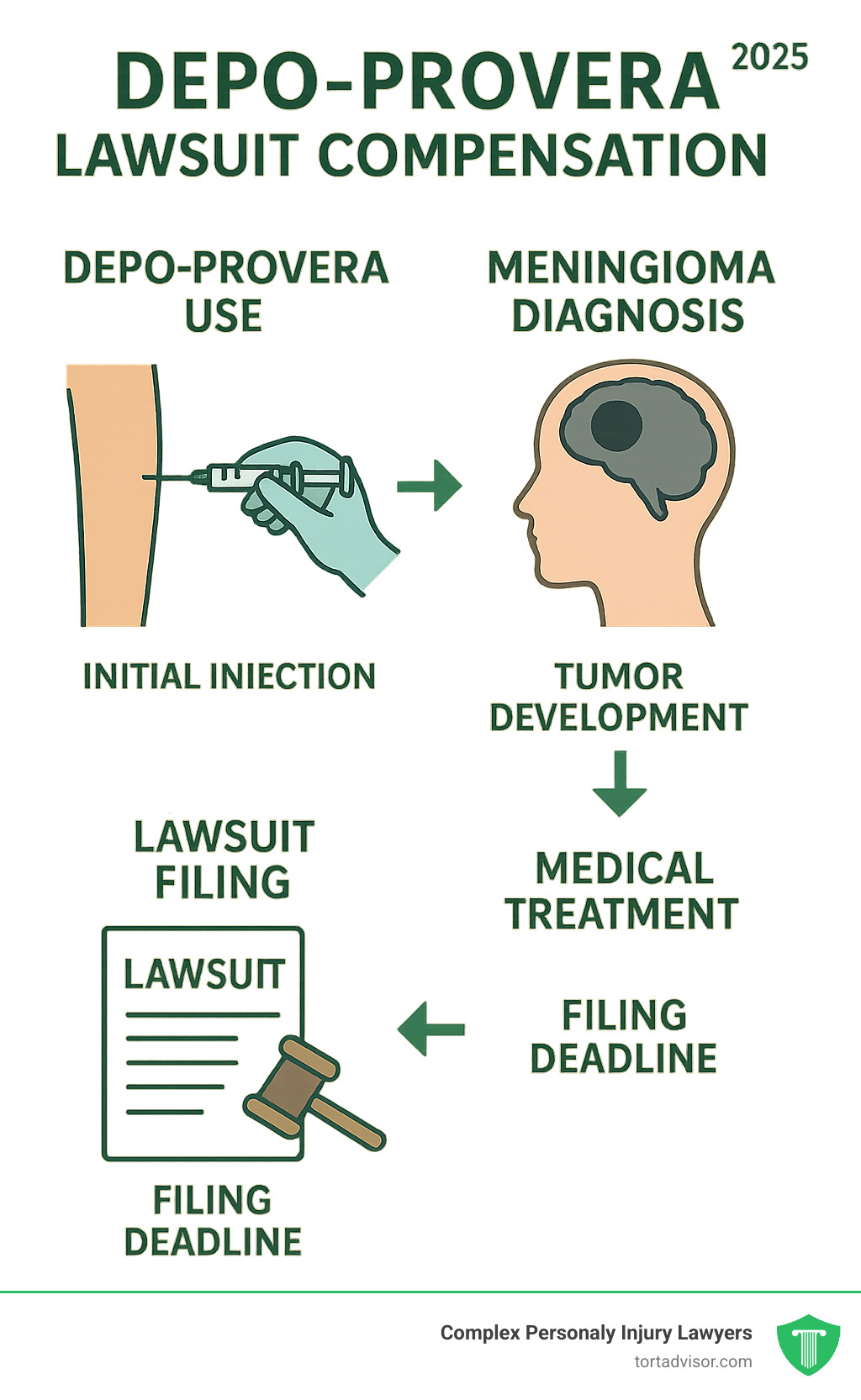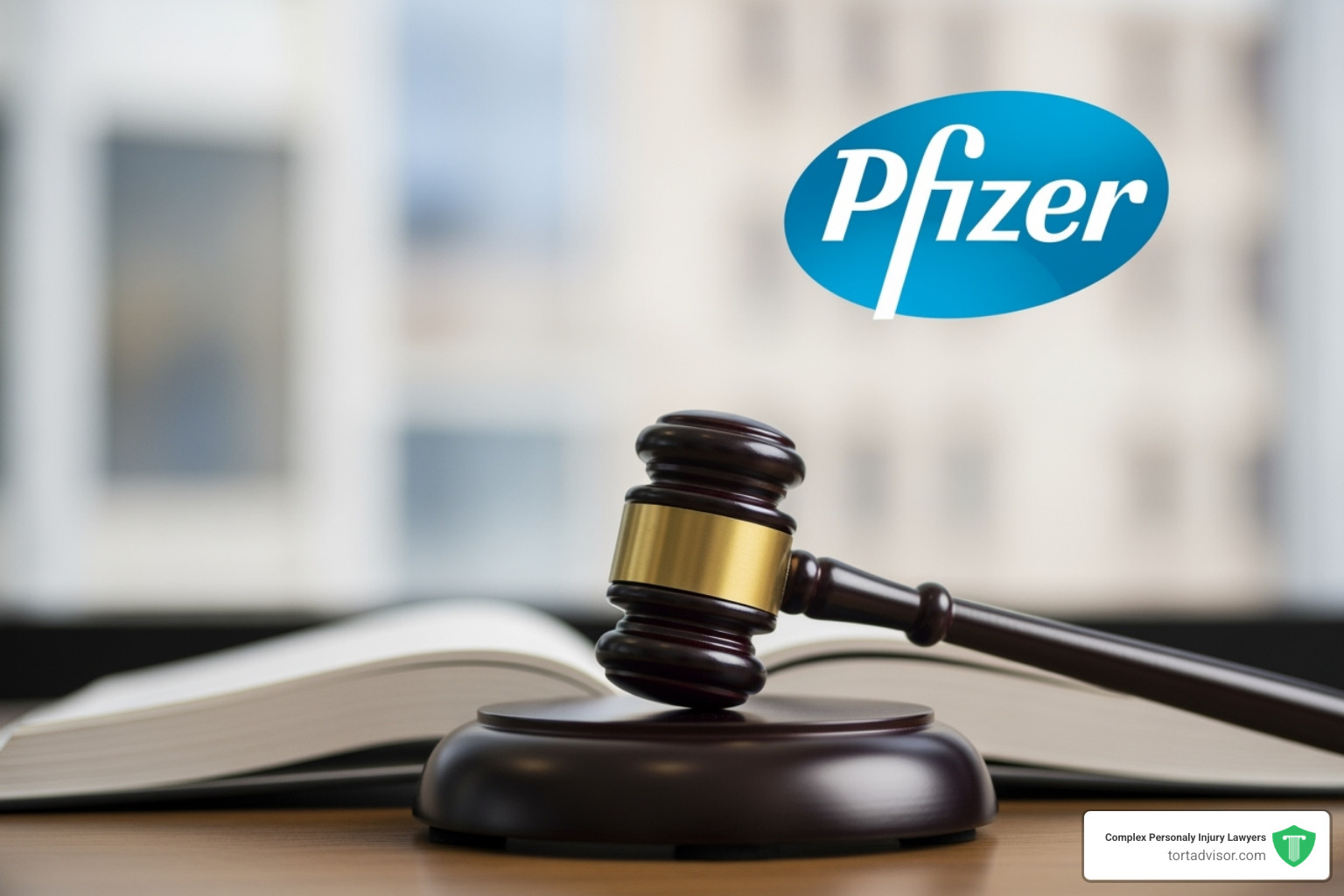


Why Understanding Depo Provera Lawsuit Compensation Matters
If you developed a meningioma brain tumor after using the Depo-Provera birth control shot, you could be entitled to significant financial compensation. Depo Provera lawsuit compensation can range from $100,000 to over $500,000 based on the severity of your injuries.
Quick Compensation Overview:
- Tier 1 (Severe Cases): $300,000 – $500,000+
- Tier 2 (Moderate Cases): $200,000 – $300,000
- Tier 3 (Mild Cases): $100,000 – $200,000
- Factors: Tumor grade, surgery required, long-term disability, lost wages
The stakes are high. A recent study revealed that women using Depo-Provera for over a year have a 5.6 times higher risk of developing meningiomas. This isn’t just a statistic; it represents real women facing life-altering diagnoses, mounting medical bills, and uncertain futures.
As of 2025, hundreds of lawsuits have been consolidated into a Multidistrict Litigation (MDL 3140). Unlike a class action, an MDL evaluates each case individually, so your compensation is based on your specific damages.
The legal theory is straightforward: Pfizer allegedly knew about the brain tumor risks but failed to adequately warn American patients. While Canadian Depo-Provera labels include meningioma warnings, U.S. labels do not.
I’m Mason Arnao of Complex Personal Injury Lawyers. My work connecting victims with top attorneys gives me unique insight into these complex pharmaceutical cases and the factors that drive successful outcomes.
Simple guide to Depo Provera lawsuit compensation terms:
- Depo Provera severe side effects
- depo provera bone loss lawsuit
- depo shot brain tumor
The Science Behind the Lawsuit: Depo-Provera and Meningioma Brain Tumors
The science behind these lawsuits explains why women are seeking Depo Provera lawsuit compensation. It’s about biology and how synthetic hormones can affect the brain.
The link between Depo-Provera and brain tumors involves its active ingredient, medroxyprogesterone acetate (MPA). This synthetic hormone is under scrutiny after research revealed its connection to meningiomas—tumors on the protective membranes of the brain and spinal cord.
A landmark 2024 study in The British Medical Journal provided the key scientific evidence linking Depo-Provera to brain tumors. It found that women using the shot for over a year had a 5.6 times higher risk of developing meningiomas.
Scientifically, this is concerning because meningioma cells have progesterone receptors. When the synthetic progesterone in Depo-Provera binds to these receptors, it may stimulate tumor growth.
What is Depo-Provera and How Does It Work?
Depo-Provera is an injectable birth control administered every 12 weeks, offering a convenient alternative to daily pills. It works by preventing ovulation, thickening cervical mucus to block sperm, and thinning the uterine lining.
Beyond birth control, doctors prescribe it for endometriosis treatment and other hormonal conditions. Its convenience made it popular, but the long-acting formula means extended exposure to synthetic hormones, increasing potential risks.
What is a Meningioma?
A meningioma is a tumor that grows on the meninges, the protective layers surrounding the brain and spinal cord. Most meningiomas are typically benign (non-cancerous) and slow-growing. However, even benign tumors can cause serious issues by pressing on brain tissue.
As the most common primary brain tumor, they are classified by grade: Grade I (slow-growing), Grade II (atypical, faster growth), and Grade III (malignant and aggressive). A tumor’s location is critical; a small one in a sensitive area can be more problematic than a larger one elsewhere. The Mayo Clinic offers more detail on these “benign” but dangerous tumors.
Symptoms and Complications of Meningiomas
Meningioma symptoms can develop gradually, and sometimes tumors are finded accidentally. Common warning signs include persistent headaches that worsen over time and vision or hearing changes, such as blurred vision or ringing in the ears.
Other symptoms can include:
- Seizures
- Memory loss or cognitive changes
- Weakness in limbs, often on one side
- Numbness or balance problems
- Speech difficulties
Potential complications are serious, including permanent neurological damage, vision loss, paralysis, and cognitive decline. In rare cases, they can be life-threatening. If you used Depo-Provera and have these symptoms, see a doctor immediately. Early detection is key.
The Legal Fight: Why Pfizer is Facing Lawsuits
Pharmaceutical giant Pfizer is facing serious legal challenges over Depo-Provera. The core issue is failure to warn—a fundamental responsibility of any drug manufacturer.
The central allegation in these Depo Provera lawsuit compensation cases is that Pfizer knew of the brain tumor risks but failed to warn American patients and doctors. This goes beyond negligence to product liability and a breach of trust.
A key point in the litigation is the discrepancy in warnings: Canadian labels included meningioma risks while U.S. labels did not. This difference is a cornerstone of the current Multidistrict Litigation (MDL).
The Legal Basis: Failure to Warn
In legal terms, failure to warn occurs when a manufacturer knows of a danger but doesn’t inform consumers. This is precisely what plaintiffs allege happened with Depo-Provera.
The allegations against Pfizer are serious: the company allegedly knew of the brain tumor risks but failed to include an adequate warning on U.S. labels. This claim is strengthened by comparing the U.S. label to the Canadian product monograph, which has warned of meningiomas for years.
The central question is: why were Canadian women warned while American women were not? This represents a fundamental breach of consumer safety and patient trust, preventing informed healthcare decisions.
Current Status of Depo-Provera Litigation
The litigation is active. Federal Depo-Provera lawsuits are consolidated into MDL 3140 in the Northern District of Florida, overseen by Judge M. Casey Rodgers. This consolidation of federal cases streamlines the process while allowing for individual attention.
Crucially, this is not a class action. It involves individual lawsuits grouped for pretrial efficiency. This means your Depo Provera lawsuit compensation is based on your unique damages, not split among a large group.
As of mid-2025, the MDL included over 435 cases and continues to grow. Key court orders are moving the litigation forward, with both sides preparing for potential bellwether trials. While litigation against a company like Pfizer takes time, the MDL structure benefits plaintiffs by allowing for shared resources and coordinated legal strategies.
Understanding Depo Provera Lawsuit Compensation
If you’re facing a meningioma diagnosis after using Depo-Provera, understanding your potential Depo Provera lawsuit compensation is about securing the financial support needed to rebuild your life.
Lawsuit compensation covers two main types of damages. Economic damages are tangible financial losses like medical bills, treatment costs, and lost wages, including future expenses and lost earning capacity. Non-economic damages cover intangible impacts like pain and suffering, emotional distress, and loss of enjoyment of life.
In some cases, punitive damages may be awarded. These are not to compensate you, but to punish Pfizer for allegedly hiding known risks and to deter similar behavior in the future. Your individual case value is unique, and the MDL structure ensures your compensation is based on your specific damages, not a group average.
Factors Influencing Depo Provera Lawsuit Compensation
Several factors determine your Depo Provera lawsuit compensation, reflecting how the diagnosis has impacted your life.
- Severity of Injury: This is the most significant factor. The meningioma grade (from a less severe Grade I to a malignant Grade III) directly impacts your treatment and compensation potential.
- Surgery Requirements: The need for a craniotomy or multiple procedures heavily influences compensation due to the high financial and physical costs.
- Long-Term Disability: Permanent neurological damage, cognitive issues, or physical limitations that affect your work and daily life significantly increase case value.
- Age: A younger victim often faces a longer period of impact from lost earnings and future medical needs, which can lead to higher compensation.
- Duration of Depo-Provera Use: Since research links risk to use over 12 months, longer exposure can strengthen your claim.
- Impact on Quality of Life: The personal, emotional, and social toll is a critical component of your compensation.
Estimated Depo Provera Lawsuit Compensation Tiers
While every case is unique, legal experts estimate potential Depo Provera lawsuit compensation in tiers based on injury severity. These are estimates, and individual results will vary.
| Tier | Severity Description | Estimated Compensation Range |
|---|---|---|
| Tier 1 (Severe Cases) | Malignant or aggressive tumors requiring extensive surgery and causing significant permanent disabilities. | $300,000 – $500,000+ |
| Tier 2 (Moderate Cases) | Symptomatic tumors requiring surgery with some lingering effects and need for ongoing monitoring. | $200,000 – $300,000 |
| Tier 3 (Mild Cases) | Smaller, benign tumors with successful treatment and minimal long-term effects. | $100,000 – $200,000 |
Some legal experts project higher settlements, potentially from $275,000 to $750,000, with the most severe cases possibly reaching millions. Past meningioma lawsuit payouts provide a hopeful, though not guaranteed, precedent. These figures offer hope, but your compensation will depend on your unique circumstances. This is why experienced legal counsel is essential.
Taking Action: How to File a Claim and Secure Your Rights
When pursuing Depo Provera lawsuit compensation, time is critical. The clock starts ticking from the moment you find your injury. Strict legal deadlines called statutes of limitations vary by state (typically 1-6 years from findy) and missing them can bar your claim entirely.
Meningiomas can develop slowly, appearing years after your last injection. This makes acting quickly crucial. A successful claim requires strong evidence collection, including medical records, prescription history, and expert testimony to establish causation.
Navigating this process alone is nearly impossible; legal counsel is essential. The attorneys in the Tort Advisor network specialize in these cases.
What Evidence is Needed for a Strong Claim?
Building a strong legal case requires comprehensive evidence to tell your complete story.
- Medical records confirming your meningioma diagnosis: This includes MRI/CT scans, pathology reports, and doctor’s notes detailing the tumor’s type, grade, and location.
- Pharmacy records showing Depo-Provera use: These are crucial to prove you took the drug and for how long, establishing the link to your injury.
- Doctor’s notes and medical history: These document your symptoms and treatment. A note from a medical professional suggesting a link to Depo-Provera can be powerful evidence.
- Proof of lost income and medical expenses: Pay stubs, tax returns, bills, and receipts document the financial burden.
- A personal journal: Documenting your daily symptoms and their impact on your life provides a human story that complements the medical records.
What Should You Do if You Believe You Were Harmed?
If you suspect Depo-Provera caused your meningioma, take these steps immediately:
- Consult a doctor: Your first priority is your health. This ensures you get proper care and creates medical records vital for your case.
- Preserve all records: Keep all medical and pharmacy records. Even minor documents can become important evidence.
- Do not sign any waivers: Never sign settlement offers from insurance companies or manufacturers without legal advice. Early offers are typically far below what you deserve.
- Contact an experienced attorney promptly: Statutes of limitations are strict. An attorney can determine your deadline and protect your rights. The attorneys in our network can quickly assess your claim, gather evidence, and meet all deadlines. They work on contingency, so you pay no fees unless you win.
Frequently Asked Questions about Depo-Provera Lawsuits
Facing a lawsuit after a medical diagnosis brings many questions. Here are answers to common concerns about Depo Provera lawsuit compensation.
What is the difference between a class action and the Depo-Provera MDL?
Understanding this difference is crucial, as it directly affects your compensation. In a class action lawsuit, all plaintiffs are grouped into a single case, and any settlement is divided among all members, often regardless of individual injury severity.
The Depo-Provera Multidistrict Litigation (MDL) is different. Cases are consolidated in one court for efficient pretrial proceedings, but each plaintiff retains an individual lawsuit. Your Depo Provera lawsuit compensation is based on your specific damages—medical bills, lost wages, and pain and suffering. This ensures that compensation is custom to the severity of your unique situation.
Can I file a lawsuit if I used a generic version of Depo-Provera?
The short answer is: possibly. You should consult an attorney to discuss your specific situation. Legally, this is complex. Generic drug manufacturers are typically required to copy the brand-name label, which can shield them from some liability.
However, the lawsuits argue that Pfizer’s failure to provide adequate warnings is the root problem. The theory is that if Pfizer’s label had been accurate, the generic label would have been too. Therefore, Pfizer may still be held responsible. Some states also have “innovator liability” laws, which allow lawsuits against the brand-name manufacturer even if you used a generic version. An experienced attorney can evaluate your options.
How long does it take to get a settlement?
The honest answer is that mass tort litigation like the Depo-Provera MDL can take several years to resolve. The process involves complex phases:
- Findy Phase: Both sides exchange and review millions of pages of documents to build their cases.
- Bellwether Trials: A small number of “test cases” go to trial first. These help both sides gauge arguments and potential outcomes, often paving the way for broader settlement talks.
- Settlement Negotiations: After bellwether trials, serious negotiations can begin. Once a global settlement framework is reached, individual cases can be resolved more quickly.
The timeline varies greatly for each case. An experienced attorney will keep you informed and work tirelessly to achieve the best possible outcome for you.
How an Experienced Attorney Can Maximize Your Compensation
Taking on a pharmaceutical giant like Pfizer alone is a monumental task. The legal landscape for Depo Provera lawsuit compensation is complex, involving intricate medical and scientific evidence.
The right legal team is essential. At Complex Personal Injury Lawyers, we connect victims with highly skilled legal teams who have proven track records in pharmaceutical lawsuits. This allows you to focus on your recovery, not on legal battles.
We act as your legal matchmaker, working exclusively with top-rated specialty attorneys nationwide. These are not general practitioners; they are dedicated experts in pharmaceutical litigation who understand the specific nuances of Depo-Provera cases.
Our network attorneys have proven results. They know how to interpret complex medical evidence, leverage scientific studies, and present your story effectively to maximize your Depo Provera lawsuit compensation.
The attorneys we connect you with handle the entire legal process: gathering records, working with medical experts, calculating all your damages, and negotiating aggressively with Pfizer’s legal team for the compensation you deserve.
While your attorney handles the legal heavy lifting, you can focus on your health and recovery, confident that your case is in expert hands.
If you or a loved one developed a meningioma after using Depo-Provera, don’t let legal complexity stop you from seeking justice. Time is limited by statutes of limitations, so it’s crucial to act.
We are here to connect you with attorneys who will fight for your rights and help you explore your legal options.
Free Confidential Case Evaluation
Complete the short form below to get an immediate FREE case review with an expert in your specific claim. Don't wait, your case could be time sensitive to file a claim.
Related Posts
Discover New Jersey disability benefits: TDI, FLI, SSDI, SSI rates, eligibility, applications & appeals for 2025-2026.
Hire a Depo-Provera lawsuit attorney now. Fight Pfizer for meningioma risks from injections. Free consult, MDL updates & settlements up to $1.5M.
Find top Miami florida car accident lawyers after your 305 crash. Get max compensation, navigate no-fault laws & choose the best experts now!
Diagnosed with cancer after Roundup? Learn about the monsanto roundup lawsuits, eligibility criteria, and how to pursue your claim.
Discover how do you qualify for a hair relaxer lawsuit: criteria, diagnoses, evidence & brands in uterine cancer MDL. Claim review now!
Find the best uber sexual assault lawsuit lawyer: expert guides, MDL experience, proven results & nationwide firms for justice.










